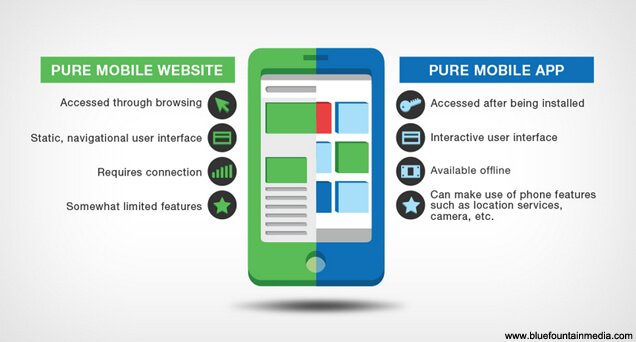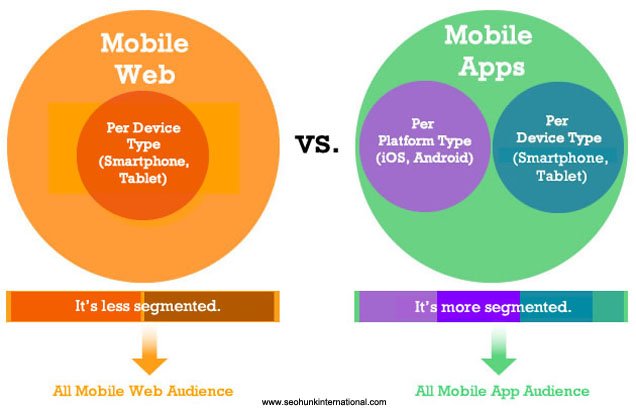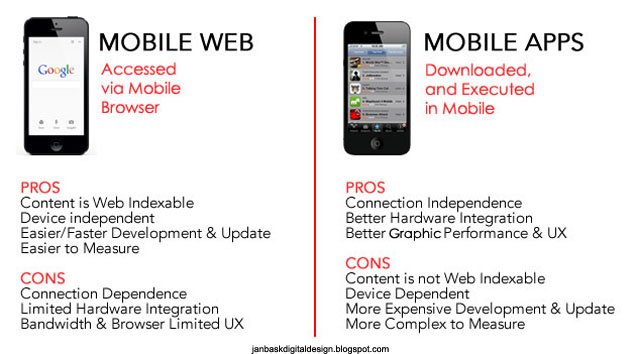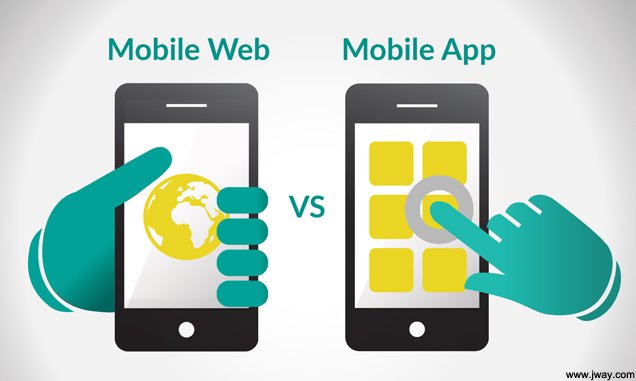In the tech universe, there’s an elaborate and intriguing discussion about smartphone apps and the web -what are both of them capable of, how discovery works, how they interact, whether the web will become the dominant form and so on. But for a brand that is already in existence, publishers and developers always wonder if they should do an app or a website, however, the only answer to all questions is quite simple and less technical:
Would somebody want to put your icon on their home screen?
To engage in weighing out all options with mobile websites and apps, there needs to be a clear understanding of the difference between mobile apps and mobile websites. Even though both of them are used on the same platforms (tablets and smartphones), mobile applications (apps) and mobile websites (also known as Web Apps) are quite different from each other. A mobile app is a program which is downloaded and installed onto a user’s mobile device, whereas a mobile website is simply a website modified to suit tablet and smartphone formats.
Mode of Access
A mobile website is made use of through an internet browser like Chrome and Firefox, by typing out the website’s URL in the navigation bar. It means that no download of any kind is required. But an internet connection is must in order to access it.

A mobile application is downloaded either from an online store on the mobile device such as an app store or Google Play. This application is then saved on the device and in some cases it has offline modes too and it does not require an internet connection in order to work.
Purpose of Usage
A mobile app is perfect for regular and recurrent use since it remains on a user’s smartphone, unless manually deleted by the users themselves. It is a response to a specific need, while at the same time contributing to an increase in customer loyalty.
However, a mobile website is intended for mobile communication carrying the purpose of informing a large audience, with no specific time window, or for specific events and their promotion to a targeted audience, in a limited time frame.

Different Updating Setups
A mobile website is updated without a user’s knowledge. It is an automatically programmed, online process.
For mobile apps however, it is necessary for users to download and approve each update, it can either be automatic or manual.
Now that the basic differences have been established between mobile apps and mobile websites, the pros and cons of both are listed below, so that you can find your perfect option because both of them serve different purposes.

Pros and Cons of a Mobile Website
Usually, a mobile website does not mean a separate website, it is in fact a design which is responsive and mostly works for all kinds of screens. Mobile users are able to access most of the content a desktop website contains, but in a way which is tweaked or adjusted for smaller screens.
Pros
• You do not need to spend as much – since it is usually contained within the price of designing a basic desktop website.
• It works smoothly on all devices – there is no need to create separate websites for Android or iOS.
• It is easy to setup – app stores do not come into the picture anywhere, only things required are – a domain and hosting.
Cons
• You do not receive any push notifications
• They cannot be accessed in the offline mode
• They do not have any presence in app stores
• Many mobile websites have poor designs and it can entail problems like
(a) Performance issues
(b) Chaotic design
(c) Poor utility
Well-designed mobile websites can prove to be a giant asset for your enterprise, because almost 1/3rd of the total internet traffic is mobile, so it would be a mistake not to have one. They are inexpensive to setup, can be accessed on all devices, and are easier to maintain and update.

Pros and Cons of a Mobile App
Mobile apps can do things websites can’t, like push notifications and offline access, but they also have cons. They aren’t necessary for some people, for example if you are a casual mommy blogger you probably don’t need an app. However, many businesses can benefit from one, let’s look at the pros and cons.
Pros
• You are able to receive push notifications – and can even send text messages to your users.
• In many cases, they can be accessed in the offline mode – users can read articles, listen to podcasts, or browse a product catalog while they are getting bored or have nothing to do.
• Their performance is better – well designed apps workfaster than a mobile website.
• They are less cluttered and chaotic – it depends on the website design, but generally apps tend to have lesser elements.
• Visibility on the app stores – it is another way of increasing your brand’s online presence and can even increase customer loyalty. Plus, another icon on a user’s smartphone home screen.
Cons
• It costs extra – Many apps have a paid subscription.
• Extra effort to set it up – the app is worked upon, which is not an easy task and is then submitted to the app stores.

Mobile apps help in delivering content to the users swiftly and faster than a mobile website, and it even helps in keeping them engaged. Whether you are publishing articles or selling products, sending push notifications is a huge advantage. Apps are better for accessing content offline, such as listening to audio or reading an article while you’re in a leisurely mood. However, a lot of extra time and money need to be invested in them and not all enterprises are prepared for that.
Who is the winner then? The winner would be your preference. At the end of the day, keeping factors like time, money and other infrastructural resources in mind, the choice of having a mobile app or a website depends entirely upon how much your business can invest.
“When do you know you need a mobile app” is a crucial question again. Read on further to dig deeper into the dilemma.






